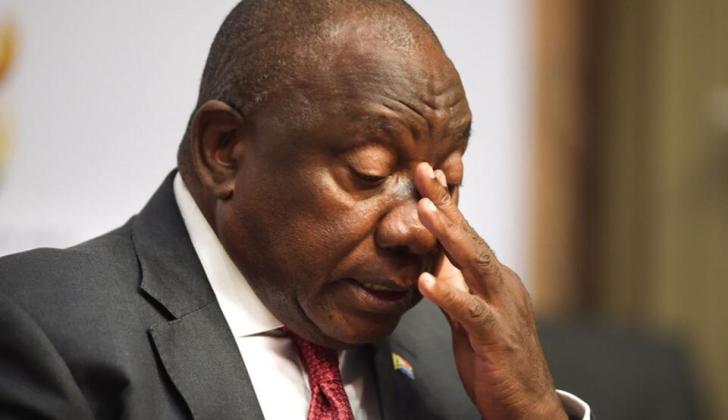News / National
ANC introduces its version of Chitepo School of Ideology
29 Oct 2024 at 08:03hrs |
0 Views

As the African National Congress (ANC) works to rebuild its relationship with the electorate following significant electoral setbacks, the party has declared political education a top priority. All ANC members will be required to complete a foundational course designed to enhance their intellectual capabilities and moral compass by December 2026. This initiative was unveiled during a recent three-day National Executive Committee (NEC) meeting held at Birchwood Hotel.
President Cyril Ramaphosa addressed the meeting, acknowledging that the party is currently facing a crisis of authority, legitimacy, and trust. The ANC's declining public support is reflected in its electoral performance over recent years. In the 2019 general elections, the ANC secured only 57.5% of the vote, a decrease from 62.2% in 2014. This downward trend continued with a dismal 46.5% of the vote in the 2021 local government elections - the party's worst performance in democratic South Africa. Most recently, in the May 2024 national elections, ANC support plummeted to just 40.2%.
At the launch of the mandatory political education course, Ramaphosa emphasized its potential benefits in addressing factionalism and improving the party's overall ethics. "There is evidence that when we do spread political education, our comrades become much sharper, much more committed," he stated. "It also sharpens and straightens out the ethics and the morals and the values of our organisation."
David Makhura, head of the ANC's political school, outlined that all members, both new and existing, will be required to attend the course in person and complete five modules covering the history of the ANC, the party's vision for South Africa, contemporary issues, the Constitution and the Bill of Rights, and the responsibilities of ANC members. This course will also serve as an induction program for new applicants during their six-month probation period.
Ramaphosa noted that equipping ANC leaders with the necessary skills to address community challenges is essential for the party's revival. "Armed with this, the ANC is going to emerge much stronger," he remarked, referencing the values upheld by the late ANC leader OR Tambo.
The ANC's challenges extend beyond electoral losses; the party has faced intense scrutiny following the establishment of the Zondo Commission of Inquiry into State Capture. Numerous party members have been implicated in various corruption scandals, eroding public trust in the ANC. Notable figures such as former ministers Malusi Gigaba, David Mahlobo, and Cedric Frolick have been accused of serious misconduct.
In light of these corruption allegations, the ANC has mandated that all implicated members appear before the Integrity Commission, which advises the NEC on issues affecting the party's reputation. Some members have reportedly ignored this directive, leading to the NEC's decision to refer them to the National Disciplinary Committee.
Ramaphosa emphasized that the NEC has resolved to finalize all integrity commission reports, acknowledging that while some reports have been acted upon, others have been rendered irrelevant by subsequent events. The NEC has instructed the secretary-general to process accepted recommendations and provide updates to the Integrity Commission.
To enhance the commission's effectiveness, the NEC has also resolved to amend its terms of reference to clarify its responsibilities. The ANC's commitment to political education and integrity reform signifies its intention to rebuild public confidence and restore its standing as a trusted political force in South Africa.
President Cyril Ramaphosa addressed the meeting, acknowledging that the party is currently facing a crisis of authority, legitimacy, and trust. The ANC's declining public support is reflected in its electoral performance over recent years. In the 2019 general elections, the ANC secured only 57.5% of the vote, a decrease from 62.2% in 2014. This downward trend continued with a dismal 46.5% of the vote in the 2021 local government elections - the party's worst performance in democratic South Africa. Most recently, in the May 2024 national elections, ANC support plummeted to just 40.2%.
At the launch of the mandatory political education course, Ramaphosa emphasized its potential benefits in addressing factionalism and improving the party's overall ethics. "There is evidence that when we do spread political education, our comrades become much sharper, much more committed," he stated. "It also sharpens and straightens out the ethics and the morals and the values of our organisation."
David Makhura, head of the ANC's political school, outlined that all members, both new and existing, will be required to attend the course in person and complete five modules covering the history of the ANC, the party's vision for South Africa, contemporary issues, the Constitution and the Bill of Rights, and the responsibilities of ANC members. This course will also serve as an induction program for new applicants during their six-month probation period.
The ANC's challenges extend beyond electoral losses; the party has faced intense scrutiny following the establishment of the Zondo Commission of Inquiry into State Capture. Numerous party members have been implicated in various corruption scandals, eroding public trust in the ANC. Notable figures such as former ministers Malusi Gigaba, David Mahlobo, and Cedric Frolick have been accused of serious misconduct.
In light of these corruption allegations, the ANC has mandated that all implicated members appear before the Integrity Commission, which advises the NEC on issues affecting the party's reputation. Some members have reportedly ignored this directive, leading to the NEC's decision to refer them to the National Disciplinary Committee.
Ramaphosa emphasized that the NEC has resolved to finalize all integrity commission reports, acknowledging that while some reports have been acted upon, others have been rendered irrelevant by subsequent events. The NEC has instructed the secretary-general to process accepted recommendations and provide updates to the Integrity Commission.
To enhance the commission's effectiveness, the NEC has also resolved to amend its terms of reference to clarify its responsibilities. The ANC's commitment to political education and integrity reform signifies its intention to rebuild public confidence and restore its standing as a trusted political force in South Africa.
Source - online
Join the discussion
Loading comments…



























